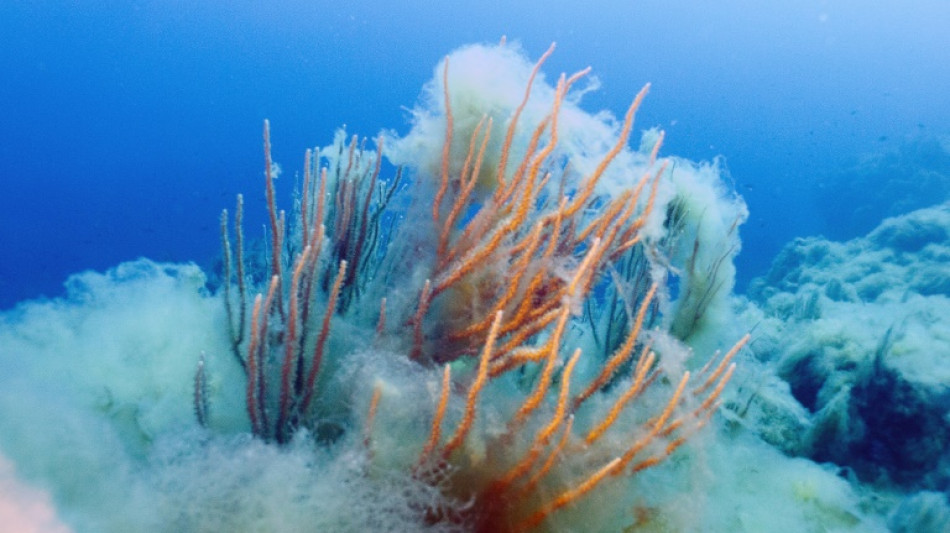
-
 Where Trump's tariffs could hurt Americans' wallets
Where Trump's tariffs could hurt Americans' wallets
-
Trump says 'very close to a deal' on TikTok

-
 Trump tariffs on Mexico: the good, the bad, the unknown
Trump tariffs on Mexico: the good, the bad, the unknown
-
Postecoglou denies taunting Spurs fans in Chelsea defeat

-
 Oscar-winning Palestinian director speaks at UN on Israeli settlements
Oscar-winning Palestinian director speaks at UN on Israeli settlements
-
With tariff war, Trump also reshapes how US treats allies

-
 Fernandez fires Chelsea into fourth as pressure mounts on Postecoglou
Fernandez fires Chelsea into fourth as pressure mounts on Postecoglou
-
South Korea court to decide impeached president's fate

-
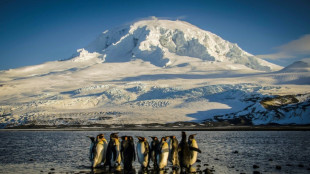 Penguin memes take flight after Trump tariffs remote island
Penguin memes take flight after Trump tariffs remote island
-
E.T., no home: Original model of movie alien doesn't sell at auction

-
 Italy's Brignone has surgery on broken leg with Winter Olympics looming
Italy's Brignone has surgery on broken leg with Winter Olympics looming
-
Trump defiant as tariffs send world markets into panic
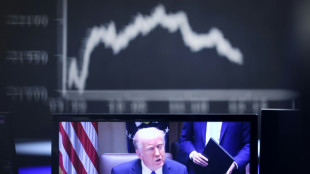
-
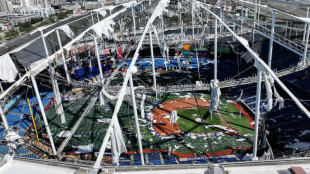 City officials vote to repair roof on home of MLB Rays
City officials vote to repair roof on home of MLB Rays
-
Rockets forward Brooks gets one-game NBA ban for technicals

-
 Pentagon watchdog to probe defense chief over Signal chat row
Pentagon watchdog to probe defense chief over Signal chat row
-
US tariffs could push up inflation, slow growth: Fed official

-
 New Bruce Springsteen music set for June 27 release
New Bruce Springsteen music set for June 27 release
-
Tom Cruise pays tribute to Val Kilmer

-
 Mexico president welcomes being left off Trump's tariffs list
Mexico president welcomes being left off Trump's tariffs list
-
Zuckerberg repeats Trump visits in bid to settle antitrust case

-
 US fencer disqualified for not facing transgender rival
US fencer disqualified for not facing transgender rival
-
'Everyone worried' by Trump tariffs in France's champagne region

-
 Italy's Brignone suffers broken leg with Winter Olympics looming
Italy's Brignone suffers broken leg with Winter Olympics looming
-
Iyer blitz powers Kolkata to big IPL win over Hyderabad

-
 Russian soprano Netrebko to return to London's Royal Opera House
Russian soprano Netrebko to return to London's Royal Opera House
-
French creche worker gets 25 years for killing baby with drain cleaner

-
 UK avoids worst US tariffs post-Brexit, but no celebrations
UK avoids worst US tariffs post-Brexit, but no celebrations
-
Canada imposing 25% tariff on some US auto imports

-
 Ruud wants 'fair share' of Grand Slam revenue for players
Ruud wants 'fair share' of Grand Slam revenue for players
-
Lesotho, Africa's 'kingdom in the sky' jolted by Trump

-
 Trump's trade math baffles economists
Trump's trade math baffles economists
-
Gaza heritage and destruction on display in Paris

-
 'Unprecedented crisis' in Africa healthcare: report
'Unprecedented crisis' in Africa healthcare: report
-
Pogacar gunning for blood and thunder in Tour of Flanders

-
 Macron calls for suspension of investment in US until tariffs clarified
Macron calls for suspension of investment in US until tariffs clarified
-
Wall St leads rout as world reels from Trump tariffs
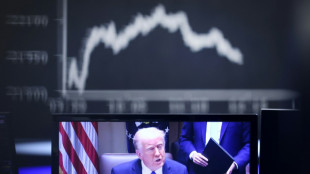
-
 Mullins gets perfect National boost with remarkable four-timer
Mullins gets perfect National boost with remarkable four-timer
-
Trump tariffs hammer global stocks, dollar and oil

-
 Authors hold London protest against Meta for 'stealing' work to train AI
Authors hold London protest against Meta for 'stealing' work to train AI
-
Tate Modern gifted 'extraordinary' work by US artist Joan Mitchell

-
 Mexico president welcomes being left off Trump's new tariffs list
Mexico president welcomes being left off Trump's new tariffs list
-
Tonali eager to lead Newcastle back into Champions League

-
 Lesotho hardest hit as new US tariffs rattle Africa
Lesotho hardest hit as new US tariffs rattle Africa
-
Stellantis pausing some Canada, Mexico production over Trump auto tariffs

-
 Rising odds asteroid that briefly threatened Earth will hit Moon
Rising odds asteroid that briefly threatened Earth will hit Moon
-
Italy reels from Brignone broken leg with Winter Olympics looming

-
 Is the Switch 2 worth the price? Reviews are mixed
Is the Switch 2 worth the price? Reviews are mixed
-
Ancelotti’s tax trial wraps up in Spain with prosecutors seeking jail

-
 Civilians act to bring aid to Myanmar earthquake victims
Civilians act to bring aid to Myanmar earthquake victims
-
US trade gap narrows in February ahead of bulk of Trump tariffs
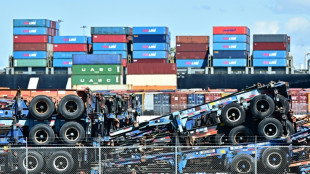

W. Mediterranean hit by 'exceptional' heatwave: experts
An "exceptional" marine heatwave is gripping the western Mediterranean with surface temperatures up to five degrees Celsius (41 degrees Fahrenheit) hotter than average, according to experts contacted by AFP.
Although the record-breaking heatwave that baked northern Europe and Britain this month has subsided, the experts said the persistently hotter-than-normal temperatures in the Mediterranean posed a threat to the entire marine ecosystem.
"This huge marine heatwave began in May in the Ligurian sea" between Corsica and Italy, said Karina von Schuckmann, an oceanographer at the non-profit research group Mercator Ocean International.
It then spread to the Gulf of Taranto in the Ionian Sea, she said.
By July, the heatwave had engulfed the Balearic Islands, Sardinia, and the Tyrrhenian Sea.
"The surface temperature anomaly map shows higher than normal values, in the order of +4 to +5C from the east of the Balearic Islands to the east of Corsica," Mercator said in a statement.
While humans might find the warmer water temperatures pleasant in the tourist hotspots of the western Mediterranean, the group warned that "ocean warming impacts the entire ecosystem."
"It is important to be aware of the possible consequences for local fauna and flora, as well as the occurrence of extreme weather events that could result in natural disasters," it said.
Von Schuckmann said that unusually warm temperatures could cause irreversible migration for some species and "mass die-offs" for others.
She noted knock-on effects for industries such as tourism and fishing which rely on favourable water conditions.
According to the UN's climate science body, marine heatwaves have already doubled in frequency globally since 1980.
- Die-offs, invasive species -
Although the Mediterranean only counts for one percent of Earth's ocean surface area, it contains nearly 20 percent of all known marine species.
A study published this month in the journal Global Change Biology found that the Mediterranean had experienced five consecutive years of mass mortality events between 2015-2019.
France's CNRS research centre has noted that marine heatwaves in 1999, 2003 and 2006 caused mass die-offs for some species, notably the posidonia, a genus of flowering plants.
"We can predict the main impact will be on fixed organisms such as plants or corals," said Charles-Francois Boudouresque, a marine ecologist at Aix-Marseille University.
Some species of fish such as the barracuda could become more abundant in warming northern Mediterranean waters, however.
Boudouresque said some species coming through the Suez Canal from the Red Sea could become problematic "within five to 10 years".
These include the rhopilema, a herbivore jellyfish Boudouresque described as "extremely greedy", and which could disrupt marine food chains.
Already abundant in the eastern Mediterranean, its appearance in western waters would threaten the algae forests that serve as nurseries for myriad varieties of fish.
Rhopilema can also sting swimmers with enough severity to require hospital treatment.
Another invasive species is the rabbit fish, which is native to the Red Sea but is increasingly found in the Mediterranean.
As there is little governments can do once a marine heatwave takes hold, Von Schuckmann said the best course of action is to reduce the greenhouse gas emissions that contribute to warming.
"Even if we stopped emitting today, the oceans, which contain 90 percent of Earth's heat, will continue to warm," she said.
"Since at least 2003 (marine heatwaves) have become more common and in future they will last longer, cover more sea, and be more intense and severe," said Von Schuckmann.
P.Stevenson--AMWN


